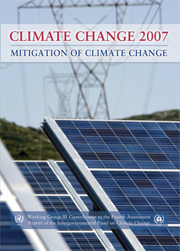 Climate Change 2007 - Mitigation of Climate Change
Climate Change 2007 - Mitigation of Climate Change Book contents
- Frontmatter
- Contents
- Foreword
- Preface
- Summary for Policymakers
- Technical Summary
- 1 Introduction
- 2 Framing issues
- 3 Issues related to mitigation in the long term context
- 4 Energy supply
- 5 Transport and its infrastructure
- 6 Residential and commercial buildings
- 7 Industry
- 8 Agriculture
- 9 Forestry
- 10 Waste management
- 11 Mitigation from a cross sectoral perspective
- 12 Sustainable Development and mitigation
- 13 Policies, instruments and co-operative agreements
- Annex I Glossary
- Annex II Acronyms, abbreviations and chemical compounds
- Annex III List of contributors
- Annex IV List of reviewers
- Index
4 - Energy supply
- Frontmatter
- Contents
- Foreword
- Preface
- Summary for Policymakers
- Technical Summary
- 1 Introduction
- 2 Framing issues
- 3 Issues related to mitigation in the long term context
- 4 Energy supply
- 5 Transport and its infrastructure
- 6 Residential and commercial buildings
- 7 Industry
- 8 Agriculture
- 9 Forestry
- 10 Waste management
- 11 Mitigation from a cross sectoral perspective
- 12 Sustainable Development and mitigation
- 13 Policies, instruments and co-operative agreements
- Annex I Glossary
- Annex II Acronyms, abbreviations and chemical compounds
- Annex III List of contributors
- Annex IV List of reviewers
- Index
Summary
EXECUTIVE SUMMARY
Annual total greenhouse gas (GHG) emissions arising from the global energy supply sector continue to increase. Combustion of fossil fuels continues to dominate a global energy market that is striving to meet the ever-increasing demand for heat, electricity and transport fuels. GHG emissions from fossil fuels have increased each year since the IPCC 2001 Third Assessment Report (TAR) (IPCC,2001), despite greater deployment of low- and zero-carbon technologies, (particularly those utilizing renewable energy); the implementation of various policy support mechanisms by many states and countries; the advent of carbon trading in some regions, and a substantial increase in world energy commodity prices. Without the near-term introduction of supportive and effective policy actions by governments, energyrelated GHG emissions, mainly from fossil fuel combustion, are projected to rise by over 50% from 26.1 GtCO2eq (7.1 GtC) in 2004 to 37–40 GtCO2 (10.1–10.9 GtC) by 2030. Mitigation has therefore become even more challenging.
Global dependence on fossil fuels has led to the release of over 1100 GtCO2 into the atmosphere since the mid-19th century. Currently, energy-related GHG emissions, mainly from fossil fuel combustion for heat supply, electricity generation and transport, account for around 70% of total emissions including carbon dioxide, methane and some traces of nitrous oxide (Chapter 1). To continue to extract and combust the world's rich endowment of oil, coal, peat, and natural gas at current or increasing rates, and so release more of the stored carbon into the atmosphere, is no longer environmentally sustainable, unless carbon dioxide capture and storage (CCS) technologies currently being developed can be widely deployed (high agreement, much evidence).
- Type
- Chapter
- Information
- Climate Change 2007 - Mitigation of Climate ChangeWorking Group III contribution to the Fourth Assessment Report of the IPCC, pp. 251 - 322Publisher: Cambridge University PressPrint publication year: 2007
- 2
- Cited by


